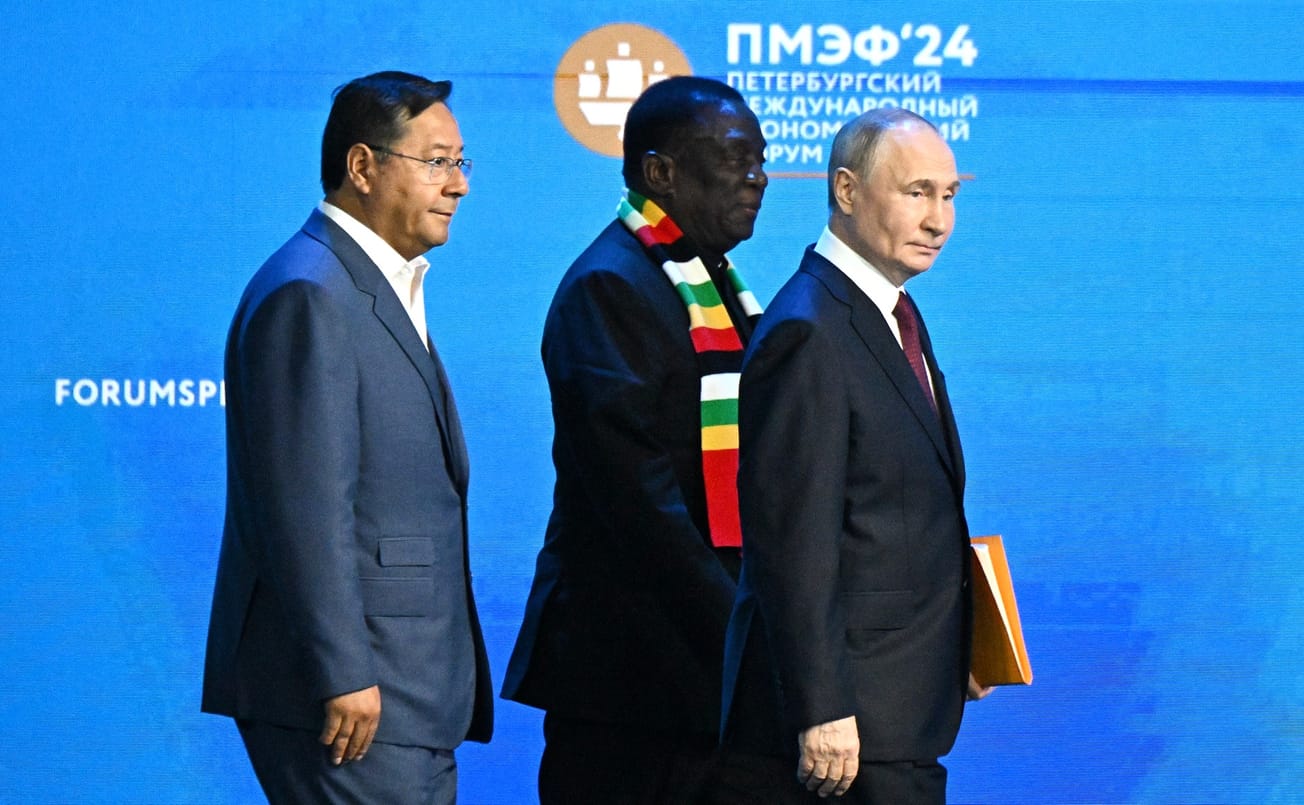This year the U.S. holiday of the Fourth of July, the commemoration of the 1776 Declaration of Independence, is the occasion calling for a renewed fight against empire. Global NATO is pushing ahead with warfare and conflict, with no let-up, rejecting all proposals for peace talks over Ukraine, Gaza, and other spheres. The end point of this evil will be nuclear annihilation, unless stopped.
The imperative for Americans, in particular, to take action to restore sanity and diplomacy to public policy, was made clear in the June 27 debate between former President Donald Trump and President Joe Biden, when it was undeniable to the whole world, what should have been no surprise: That Biden is not running the United States. Powers behind the scenes have been determining policy and calling the shots for years—call it what you will: Deep State, permanent bureaucracy, the war machine, the financial complex, etc. The narrative that the U.S. stands for democracy is now in tatters.
Furthermore, the issue of Biden’s incapacity is not about how he or a replacement can win the November election. That is scenario-mongering and avoids reality. The issue right now is stopping war, and supporting the advent of a new world development and security architecture to the benefit of all.
International Peace Coalition (IPC) has now launched a world-important initiative, at the time of the U.S. Independence Day, titled, “Declaration of Independence from Imminent Nuclear War: Begin Negotiations for Peace Now.” The IPC, a weekly international meeting of individuals and groups begun over a year ago, at the instigation of Schiller Institute founder Helga Zepp-LaRouche and collaborators, has released this Declaration for endorsement, circulation, and action immediately.
The IPC statement opens, “We, the undersigned, welcome the renewed peace initiative of the President of the Russian Federation Vladimir Putin, as currently presented in his speech at the Russian Foreign Ministry on June 14, 2024. We urge the commencement of a diplomatic process forthwith, notwithstanding the present state of hostilities between NATO/Ukraine and Russia.” The statement elaborates on the crisis situation, then delineates three recommendations:
“First, to begin initial discussions, based upon the Russian peace proposal of June 14, 2024.
“Second, based on progress in those initial discussions, to seek the earliest possible declaration of an agreed upon ceasefire in the conflict.
“Third, once an agreed-upon ceasefire’s terms have been set to paper, reinforce and strengthen trust through a new economic architecture, including forces from outside of the conflict that have advanced various proposals for advancing peace.
“We must, with regard to these negotiations, not only remember, but recommit to the lessons of the Peace of Westphalia that ended the Thirty Years’ War: a lasting peace requires that one take into account ‘the interest of the other,’ and all others, for that matter….”
This initiative comes at a time of ramped-up militarism in the countdown to the NATO Summit in Washington, D.C., on July 9-11. Yesterday at the Pentagon, U.S. Defense Secretary Austin Lloyd hosted Ukraine Defense Minister Rustem Umerov, and pledged that very soon the U.S. will provide, under the “Presidential Drawdown Authority” of Biden—think what that really means—another $2.3 billion in U.S. military aid to Ukraine.
At the same time, Secretary of State Antony Blinken and outgoing NATO Secretary General Jens Stoltenberg each castigated China yesterday, saying President Xi Jinping was supplying technology to Russian President Vladimir Putin’s military.
As it happens, these two Eurasian leaders are right now in Astana, Kazakhstan, along with 15 other head-of-state delegations, involved in a whirlwind of meetings associated with the 24th Heads of State Council of the Shanghai Cooperation Organization (SCO). July 4 will be an extraordinary meeting of the SCO-Plus, with 26 delegation participants, including observer and guest nations joining the 10 leaders of SCO member countries, in addition to multinational and other institutions represented. There are 10,000 visitors on hand in Astana for all the activity.
The function of these sessions is to further all aspects of stability, security, and development throughout Eurasia, which will contribute to a new world economic and peace architecture. President Putin described this goal in his June 14 presentation to leaders at the Russian Foreign Ministry.
An Astana Declaration will be issued on tomorrow, July 4, along with an expected 24 other joint statements. The host nation holding the SCO presidency, Kazakhstan, has sponsored one of these titled, “On World Unity for a Just Peace and Harmony,” from President Kassym-Jomart Tokayev’s initiative on this in 2023.
There are multiple other actions of note. Today China announced its backing for Kazakhstan to join the BRICS. Kazakhstan will host the next CSTO meeting in November, and President Putin has accepted his invitation to attend. President Xi Jinping and Kazakhstan President Kassym-Jomart Tokayev together participated today by livestream in the official opening ceremony for the new trans-continental, east-west trade and development corridor from China to Europe, known as the Trans-Caspian International Transport Route (TITR).
These headlines indicate the process and content of peace that is underway, if we heed the call expressed in all three declarations: the U.S. Declaration of Independence, the IPC Declaration of Independence from Imminent Nuclear War, and the Astana Declaration, forthcoming on July 4.
Helga Zepp-LaRouche, on her weekly Schiller Institute webcast today, gave a special greeting and message to Americans. “I think this is an incredible period, and the question of what will become of America, and tomorrow we have the Fourth of July, that’s a very good moment to rethink: Is it not better to think about the principles of the American Revolution, the ideals of the Founding Fathers, especially also later, John Quincy Adams’ foreign policy, because it is the question of how will the rest of the world relate to the United States, and how does the United States relate to the rest of the world?...
“The question is, can the United States come back to finding its republican tradition, and that will probably decide over war and peace on a global scale.”








